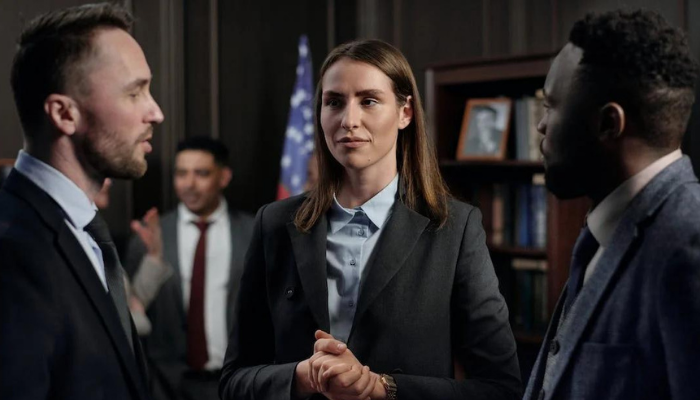Diplomats, or individuals with Feeling and Judging preferences as identified by the Myers-Briggs Type Indicator (MBTI), tend to approach conflict in a sensitive and cooperative manner.

They may prioritize preserving relationships and harmony over finding a solution that addresses the underlying issues. Here is a potential outline for a blog post on the conflict style of Diplomats:
Here are a few more points that could be included in the description of the Diplomat personality type:
- Diplomats are known for their compassionate and empathetic nature. They tend to be sensitive to the feelings and needs of others and may prioritize preserving relationships and harmony over finding a solution that addresses the underlying issues.
- Diplomats tend to be cooperative and consensual in their approach to conflict resolution. They may be more inclined to find a solution that works for everyone, rather than taking a more assertive or decisive approach.
- Diplomats may have a tendency to be more emotionally-focused in their approach to conflict. They may struggle with conflicts that involve strong emotions or interpersonal dynamics, and may find it difficult to deal with the more subjective aspects of conflict.
- Diplomats may have a harder time expressing their own needs and opinions in conflicts. They may be more inclined to put the needs of others before their own and may struggle with assertiveness.
Despite these challenges, Diplomats can be very effective in conflict situations when they learn to balance their compassionate and cooperative nature with an understanding of their own needs and boundaries.
They can be great mediators and facilitators, and can help create a harmonious and positive atmosphere in their relationships.
Table of Contents
Diplomats Advocate (INFJ-A/INTJ-T)
The Advocate personality type, as identified by the Myers-Briggs Type Indicator (MBTI), tends to approach conflict in a diplomatic and introspective manner.

Advocates, also known as INFJs (Introverted, Intuitive, Feeling, Judging), are known for their deep insights, idealism, and creativity.
When it comes to conflict, Advocates may tend to be more introspective and introverted in their approach. They may prefer to take time to think about and process their feelings and emotions before responding or engaging in conflict.
They may also be more inclined to consider the long-term consequences and implications of conflicts.
Advocates may have a tendency to be more sensitive and empathetic in their approach to conflict resolution. They may prioritize preserving relationships and harmony over finding a solution that addresses the underlying issues.
They may also be more inclined to find a solution that works for everyone, rather than taking a more assertive or decisive approach.
However, Advocates may also struggle with conflicts that involve strong emotions or interpersonal dynamics.
They may find it difficult to deal with the more subjective aspects of conflict and may have a harder time expressing their own needs and opinions.
It can be helpful for Advocates to try to balance their introspective and empathetic approach to conflict with an understanding of their own needs and boundaries.
This can help them be more effective in resolving conflicts and building positive relationships with others.
Here are a few more points that could be included in a blog post on the conflict style of Advocates (INFJ-A/INTJ-T):
Advocates may have a tendency to be more reflective and introspective in their approach to conflict.
They may prefer to take time to think about and process their feelings and emotions before responding or engaging in conflict. This can help them be more considered and measured in their approach to conflict resolution.
Advocates may be more inclined to consider the long-term consequences and implications of conflicts.
They may be more concerned with finding a solution that addresses the root causes of the issue and that is fair and just for all parties involved.
Advocates may be more sensitive and empathetic in their approach to conflict resolution, and may prioritize preserving relationships and harmony over finding a solution that addresses the underlying issues.
This can make them effective mediators and facilitators in conflict situations.
In conflicts that involve strong emotions or interpersonal dynamics, Advocates may struggle with expressing their own needs and opinions.
They may have a harder time dealing with the more subjective aspects of conflict and may benefit from learning to be more assertive and direct in their communication.
It can be helpful for Advocates to try to balance their introspective and empathetic approach to conflict with an understanding of their own needs and boundaries.
Mediator (INFP-A/INFP-T)
The Mediator personality type, as identified by the Myers-Briggs Type Indicator (MBTI), tends to approach conflict in a sensitive and introspective manner.

Mediators, also known as INFPs (Introverted, Intuitive, Feeling, Perceiving), are known for their creativity, idealism, and deep insights.
When it comes to conflict, Mediators may tend to be more introspective and introverted in their approach. They may prefer to take time to think about and process their feelings and emotions before responding or engaging in conflict.
They may also be more inclined to consider the long-term consequences and implications of conflicts.
Mediators may have a tendency to be more sensitive and empathetic in their approach to conflict resolution. They may prioritize preserving relationships and harmony over finding a solution that addresses the underlying issues.
They may also be more inclined to find a solution that works for everyone, rather than taking a more assertive or decisive approach.
However, Mediators may also struggle with conflicts that involve strong emotions or interpersonal dynamics. They may find it difficult to deal with the more subjective aspects of conflict and may have a harder time expressing their own needs and opinions.
It can be helpful for Mediators to try to balance their introspective and empathetic approach to conflict with an understanding of their own needs and boundaries. This can help them be more effective in resolving conflicts and building positive relationships with others.
Here are a few additional points that could be included in a blog post on the conflict style of Mediators (INFP-A/INFP-T):
- Mediators may have a strong sense of fairness and justice, and may be more inclined to advocate for what they believe is right, even if it means standing up to authority or challenging the status quo.
- In conflicts that involve strong emotions or interpersonal dynamics, Mediators may benefit from learning to be more aware and attuned to the feelings of others. While they may prefer to focus on the logical aspects of conflict, it’s important to also consider the emotional and relational implications of their actions and decisions.
- Mediators may be more open to unconventional or innovative solutions to conflicts. They may be willing to take risks and think outside of the box in order to find a resolution that addresses the root cause of the issue.
- It’s important for Mediators to remember to be open and receptive to the perspectives and ideas of others, even if they differ from their own. Collaborating and seeking input from others can help Mediators find more well-rounded and effective solutions to conflicts.
In order to effectively navigate conflicts, it’s important for Mediators to learn to manage their own emotions and to communicate effectively with others.
This may involve learning to be more assertive and direct in their communication style, as well as being more attuned to the emotional needs of others.
Protagonist (ENFJ-A/ENFJ-T)
The Protagonist personality type, as identified by the Myers-Briggs Type Indicator (MBTI), tends to approach conflict in a cooperative and empathetic manner.

Protagonists, also known as ENFJs (Extraverted, Intuitive, Feeling, Judging), are known for their charisma, people-oriented nature, and strong communication skills.
When it comes to conflict, Protagonists may tend to be more concerned with preserving relationships and harmony.
They may be more inclined to find a solution that works for everyone and that addresses the underlying issues in a fair and just manner.
Protagonists may be skilled at managing their own emotions in conflicts and may be able to effectively communicate and advocate for their own needs and perspectives.
They may be able to effectively mediate and facilitate resolution between conflicting parties.
However, Protagonists may also struggle with conflicts that involve strong emotions or interpersonal dynamics.
They may have a harder time dealing with the more subjective aspects of conflict and may have a tendency to put the needs of others before their own.
It can be helpful for Protagonists to try to balance their cooperative and empathetic approach to conflict with an understanding of their own needs and boundaries.
This can help them be more effective in resolving conflicts and building positive relationships with others.
Here are a few additional points that could be included in a blog post on the conflict style of Protagonists (ENFJ-A/ENFJ-T):
Protagonists may have a strong sense of social responsibility and may be motivated to find solutions that benefit the greater good.
They may be more inclined to take a leadership role in conflicts and may be effective at bringing people together to find resolution.
In conflicts that involve strong emotions or interpersonal dynamics, Protagonists may benefit from learning to manage their own emotions and to communicate effectively with others.
They may need to practice being more assertive and direct in their communication style, while still being attuned to the emotional needs of others.
Protagonists may be more inclined to consider the long-term consequences and implications of conflicts.
They may be more concerned with finding a solution that addresses the root cause of the issue and that is fair and just for all parties involved.
It’s important for Protagonists to remember to be open and receptive to the perspectives and ideas of others, even if they differ from their own. Collaborating and seeking input from others can help Protagonists find more well-rounded and effective solutions to conflicts.
In order to effectively navigate conflicts, it’s important for Protagonists to learn to balance their cooperative and empathetic approach with an understanding of their own needs and boundaries.
This can help them be more effective in resolving conflicts and building positive relationships with others.
Campaigner (ENFP-A/ENFP-T)
The Campaigner personality type, as identified by the Myers-Briggs Type Indicator (MBTI), tends to approach conflict in a flexible and adaptable manner.
Campaigners, also known as ENFPs (Extraverted, Intuitive, Feeling, Perceiving), are known for their creativity, flexibility, and enthusiasm.
When it comes to conflict, Campaigners may tend to be more open to considering multiple perspectives and approaches.
They may be more inclined to find a solution that works for everyone and that addresses the underlying issues in a fair and just manner.
Campaigners may be skilled at managing their own emotions in conflicts and may be able to effectively communicate and advocate for their own needs and perspectives.
They may be open to finding creative and unconventional solutions to conflicts.
However, Campaigners may also struggle with conflicts that involve strong emotions or interpersonal dynamics.
They may have a harder time dealing with the more subjective aspects of conflict and may have a tendency to put the needs of others before their own.
It can be helpful for Campaigners to try to balance their flexible and adaptable approach to conflict with an understanding of their own needs and boundaries.
This can help them be more effective in resolving conflicts and building positive relationships with others.
It’s important to remember that everyone is different and will approach conflict in their own way. Understanding your own MBTI type and conflict style can help you be more self-aware and better equipped to navigate conflicts in a productive and healthy manner.
Here are a few additional points that could be included in a blog post on the conflict style of Campaigners (ENFP-A/ENFP-T):
- Campaigners may have a strong sense of fairness and justice, and may be more inclined to advocate for what they believe is right, even if it means standing up to authority or challenging the status quo.
- In conflicts that involve strong emotions or interpersonal dynamics, Campaigners may benefit from learning to be more aware and attuned to the feelings of others. While they may prefer to focus on the logical aspects of conflict, it’s important to also consider the emotional and relational implications of their actions and decisions.
- Campaigners may be more open to unconventional or innovative solutions to conflicts. They may be willing to take risks and think outside of the box in order to find a resolution that addresses the root cause of the issue.
- It’s important for Campaigners to remember to be open and receptive to the perspectives and ideas of others, even if they differ from their own. Collaborating and seeking input from others can help Campaigners find more well-rounded and effective solutions to conflicts.
In order to effectively navigate conflicts, it’s important for Campaigners to learn to manage their own emotions and to communicate effectively with others.
This may involve learning to be more assertive and direct in their communication style, as well as being more attuned to the emotional needs of others.
ADVANTAGES OF DIPLOMATS IN CONFLICT

Here are some potential advantages of the Diplomat conflict style:
- Ability to maintain positive relationships and create a harmonious atmosphere: Diplomats tend to be sensitive to the feelings and needs of others and may prioritize preserving relationships and harmony over finding a solution that addresses the underlying issues. This can help them maintain positive relationships and create a harmonious atmosphere in conflicts.
- Good at mediating and finding solutions that work for everyone: Diplomats tend to take a cooperative and consensual approach to conflict resolution, which can make them effective mediators and facilitators. They may be able to find solutions that work for everyone and that address the underlying issues in a fair and just manner.
- Good at managing their own emotions in conflicts: Diplomats may be more attuned to their own emotions and may be able to effectively manage them in conflicts. This can help them stay focused and level-headed in stressful or tense situations.
- Ability to understand and appreciate the perspective of others: Diplomats tend to be empathetic and sensitive to the feelings and needs of others. This can help them understand and appreciate the perspective of others, even if it differs from their own. This can be beneficial in resolving conflicts and building positive relationships with others.
DISADVANTAGES OF DIPLOMATS IN CONFLICT
Here are some potential disadvantages of the Diplomat conflict style:
- Difficulty expressing their own needs and opinions: Diplomats may have a harder time expressing their own needs and opinions in conflicts. They may be more inclined to put the needs of others before their own and may struggle with assertiveness.
- Struggle with conflicts that involve strong emotions or interpersonal dynamics: Diplomats may have a tendency to be more emotionally-focused in their approach to conflict. They may struggle with conflicts that involve strong emotions or interpersonal dynamics, and may find it difficult to deal with the more subjective aspects of conflict.
- May prioritize preserving relationships and harmony over finding a solution that addresses the underlying issues: While this can be a strength in some situations, it can also be a disadvantage if the underlying issues are not addressed or resolved.
- May have a harder time taking decisive action: Diplomats tend to be more cooperative and consensual in their approach to conflict resolution. While this can be beneficial in finding solutions that work for everyone, it may also make them less decisive and more hesitant to take action when necessary.
7 TIPS FOR DIPLOMATS IN CONFLICT
Here are a few tips for Diplomats to consider when navigating conflicts:
- Practice effective communication: Diplomats tend to be skilled communicators, but it can still be helpful to focus on being clear, direct, and assertive in expressing your own needs and perspectives in conflicts.
- Be aware of your own emotions and manage them effectively: Diplomats may be more attuned to their own emotions, but it’s still important to manage them effectively in conflicts. This can help you stay focused and level-headed.
- Seek to understand and appreciate the perspective of others: Diplomats tend to be empathetic and sensitive to the feelings and needs of others. It can be helpful to actively listen to and try to understand the perspective of others, even if it differs from your own.
- Focus on finding mutually-beneficial solutions: Diplomats may be more inclined to find solutions that work for everyone and that address the underlying issues in a fair and just manner. This can help build positive relationships and create a harmonious atmosphere.
- Practice being assertive and direct when necessary: Diplomats may struggle with being assertive and expressing their own needs and opinions in conflicts. It can be helpful to practice being more direct and assertive when necessary, while still being respectful and empathetic towards others.
- Take time to reflect and process your feelings: Diplomats may tend to be more introspective and introverted in their approach to conflict. It can be helpful to take time to think about and process your feelings and emotions before responding or engaging in conflict.
- Remember to consider your own needs and boundaries: While it’s important to be cooperative and considerate of others in conflicts, it’s also important to remember to take care of your own needs and boundaries.
20 QUESTIONS TO ASK TO DIPLOMATS ABOUT CONFLICT
- How do you typically approach conflicts or disagreements?
- Do you find it easy or difficult to express your own needs and opinions in conflicts? Why?
- How do you typically handle conflicts that involve strong emotions or interpersonal dynamics?
- What are your priorities when it comes to resolving conflicts?
- Do you find it easy or difficult to understand and appreciate the perspective of others in conflicts? Why?
- Do you find it easy or difficult to manage your own emotions in conflicts? Why?
- How do you typically balance the needs and perspectives of different parties in conflicts?
- What strategies do you use to find mutually-beneficial solutions in conflicts?
- Do you find it easy or difficult to be assertive in conflicts? Why?
- How do you typically deal with conflicts that involve power imbalances or authority figures?
- How do you typically handle conflicts that involve difficult or resistant individuals?
- What role do you typically play in conflicts? (e.g. mediator, advocate, facilitator)
- How do you typically build and maintain positive relationships in conflicts?
- Do you find it easy or difficult to take decisive action in conflicts? Why?
- How do you typically deal with conflicts that involve compromise or sacrifice?
- Do you find it easy or difficult to adapt to new or unexpected developments in conflicts? Why?
- How do you typically handle conflicts that involve conflicting values or beliefs?
- How do you typically respond to conflicts that are escalated or not resolved effectively?
- What have you learned about your own conflict style and how you can improve it?
- What are some strategies or techniques that you have found to be effective in resolving conflicts?
https://psytify.com/personality-types/

https://psytify.com/flirting-styles-mbti-sentinels-2023/
https://psytify.com/famous-people-according-to-their-mbti-type/
https://psytify.com/what-is-mbti/
